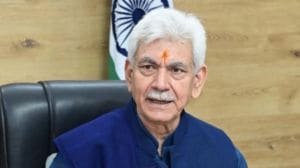Supreme Court sets aside Bombay HC orders granting bail to man accused in 59 kg cocaine, 198 kg Methamphetamine haul cases
A Supreme Court bench remitted the matters back to the Bombay High Court, asking it to take a reasoned decision within 4 weeks.
 A bench of Justices Aravind Kumar and N V Anjaria remitted the matters back to the high court, asking it to take a reasoned decision within four weeks.
A bench of Justices Aravind Kumar and N V Anjaria remitted the matters back to the high court, asking it to take a reasoned decision within four weeks.The Supreme Court has set aside two Bombay High Court orders granting bail to a man arrested by the Directorate of Revenue Intelligence (DRI) following the seizure of over 59 kilograms of cocaine and 198.1 kilograms of Methamphetamine in October 2022.
A bench of Justices Aravind Kumar and N V Anjaria remitted the matters back to the high court, asking it to take a reasoned decision within four weeks. The SC, however, allowed the accused, Vigin K Varghese, to be on bail “until the High Court takes a decision, and purely as an interim arrangement.”
The bench observed, “…while granting bail, the High Court recorded that there were no antecedents against the applicant. The material before this Court includes the Union’s assertion that the respondent had already been apprehended in connection with an earlier seizure of approximately 198.1 kilograms of Methamphetamine and 9.035 kilograms of Cocaine allegedly imported through the same channel only days before the present seizure. That assertion is neither noticed nor answered in the impugned orders.”
In the first case, DRI sleuths acting on a tip-off, intercepted a truck carrying a consignment of oranges for Varghese’s, and seized 198.10 kg of Methamphetamine and 9.035 kg of Cocaine concealed in cartons on October 2, 2022.
In the second case, DRI officials on October 6, 2022, seized 50.232 kilograms of cocaine allegedly imported from South Africa-based More Fresh Exports SA Pvt Ltd, owned by one Mansoor Thachaparambil, in the name of M/s Yummito International Foods India Pvt Ltd, of which Varghese is a Director. The contraband was allegedly hidden amidst parcels of green apples and pears. Acting on intelligence, DRI had intercepted the shipping container in which it was imported, and on examination, 50 rectangular-shaped small packages containing cocaine were recovered.
On January 22, 2025, a single bench of Justice Anil S Kilor granted bail to the accused in the second case “in absence of any material to show that the applicant had any knowledge about such contraband being the part of the consignment of Pears and in absence of any antecedents against” him.
On March 12, 2025, a single bench of Justice Milind N Jadhav also gave bail to the accused in the first case “in the absence of any prima facie material to show that the Applicant had any knowledge about contraband being part of the consignment of Oranges” and also taking into account that he had already been granted bail in the other case on January 22.
On appeal before the SC, DRI asserted that the Bombay High Court had erred in granting bail despite the seizure of a commercial quantity of narcotic substances. It contended that incriminating materials such as call data records, seizure memos, and statements recorded under the Narcotic Drugs and Psychotropic Substances Act (NDPS) “clearly implicate the respondent and reveal his active participation in facilitating import and concealment of narcotic consignments.”
Deciding the appeal, the Supreme Court said, “the High Court’s conclusion that there is no material to show that the applicant had any knowledge of the cocaine in the consignment has been arrived at without discussion of the statements of the respondent and circumstances relied upon by the prosecution, including the assertion that the respondent had placed the orders for import, controlled the logistics chain, coordinated with the overseas supplier, and was present when the consignment was opened. The High Court has not examined whether those circumstances, taken at face value for the limited purpose of bail, could prima facie indicate conscious control or involvement sufficient to attract the presumption of culpable mental state indicated under Section 35 of the NDPS Act.”
The SC said that “the High Court then, on the strength of those premises, recorded a finding that there exist reasonable grounds to believe that the applicant is not guilty of the alleged offence, treating prolonged incarceration and likely delay as the justification for bail. Such a finding is not a casual observation… A conclusion of this nature, if returned without addressing the prosecution’s assertions of operative control and antecedent involvement, risks trenching upon appreciation of evidence which would be in the domain of trial court at first instance.”
The top court said that “the orders dated 22.01.2025 and 12.03.2025 do not advert to the allegation regarding the respondent’s prior involvement in a seizure of narcotic drugs and psychotropic substances only days prior to the seizure forming the subject matter of the present complaint, nor do they engage with the prosecution’s assertion as to the respondent’s role in arranging, importing, clearing and supervising the consignments.”
It further said, “We are of the view that, in the facts of this case, it would not be appropriate for this Court at the threshold stage itself to render findings on whether there are or not reasonable grounds, for believing that the respondent is not guilty, or on whether he is likely to commit any offence while on bail. That factual assessment, which the statute requires to be made and recorded with reasons, is one that the High Court must undertake upon a complete and fair appraisal of the rival contentions based on materials placed before it.”





- 01
- 02
- 03
- 04
- 05


























